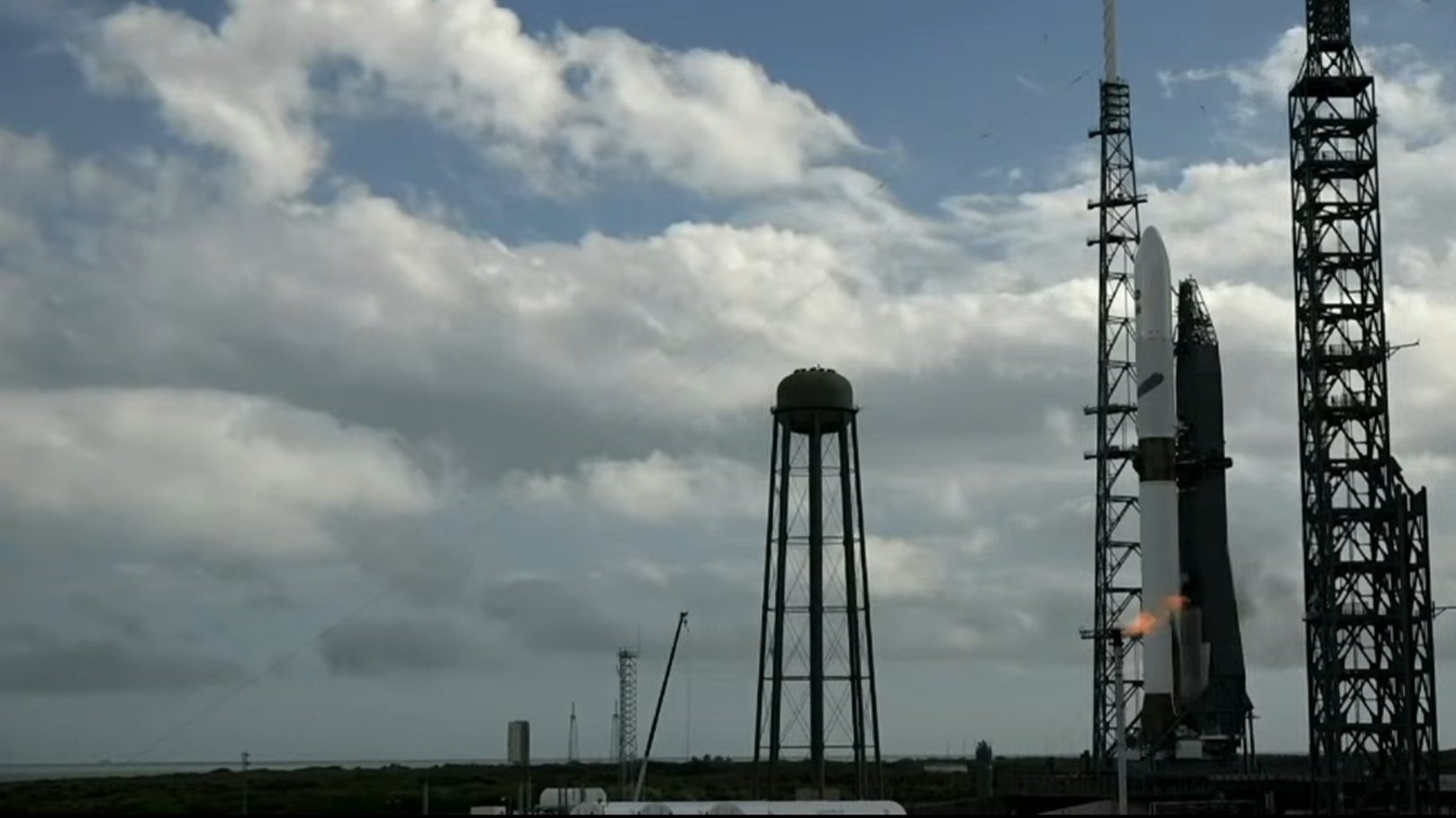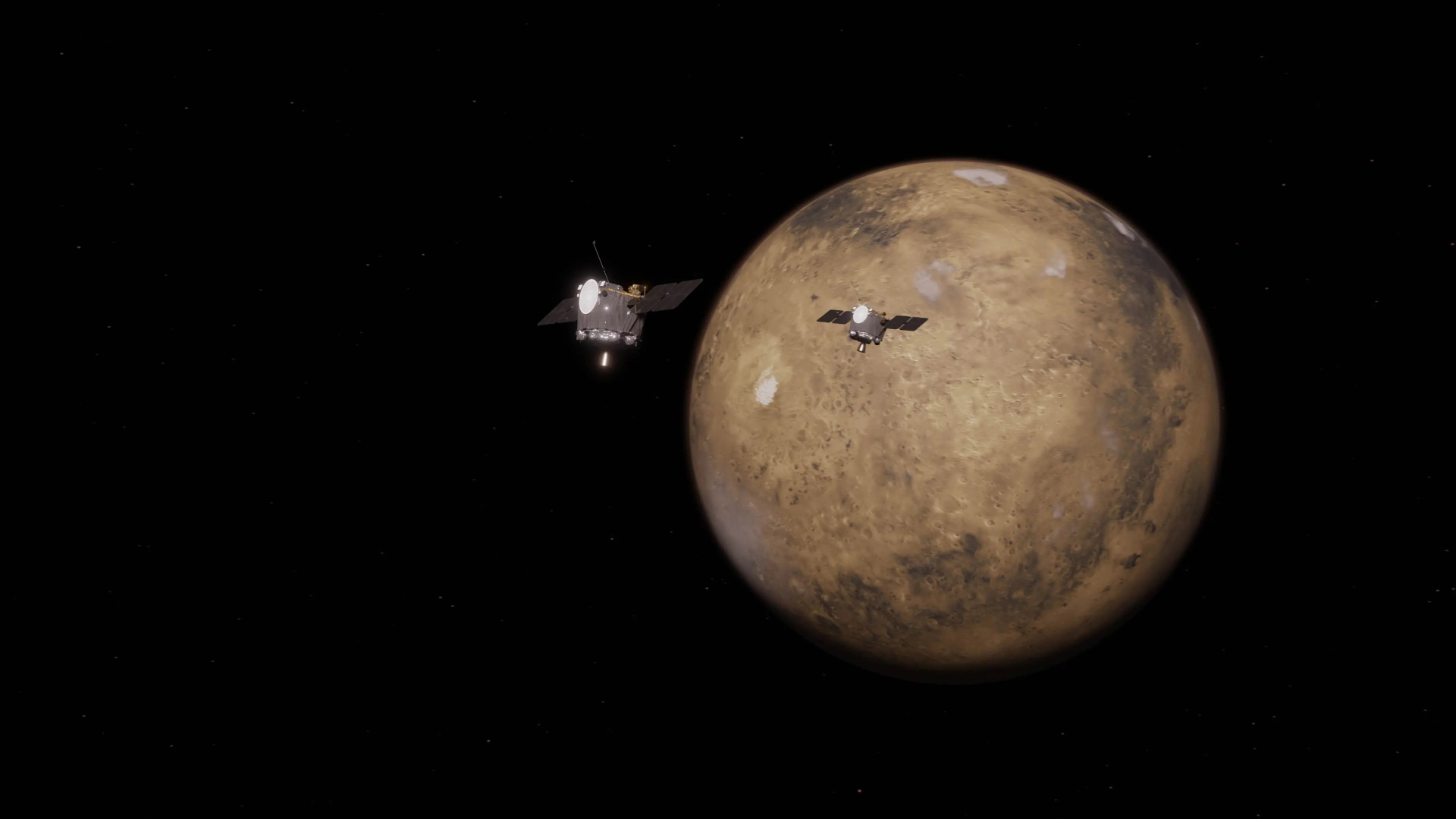Blue Origin launch of huge New Glenn rocket with NASA Mars probes delayed by weather, next try set for Nov. 12
NASA's first Mars launch in more than five years will wait a little longer to get off the ground.
Breaking space news, the latest updates on rocket launches, skywatching events and more!
You are now subscribed
Your newsletter sign-up was successful
Want to add more newsletters?

Delivered daily
Daily Newsletter
Breaking space news, the latest updates on rocket launches, skywatching events and more!

Once a month
Watch This Space
Sign up to our monthly entertainment newsletter to keep up with all our coverage of the latest sci-fi and space movies, tv shows, games and books.

Once a week
Night Sky This Week
Discover this week's must-see night sky events, moon phases, and stunning astrophotos. Sign up for our skywatching newsletter and explore the universe with us!

Twice a month
Strange New Words
Space.com's Sci-Fi Reader's Club. Read a sci-fi short story every month and join a virtual community of fellow science fiction fans!
Update for 12:30 a.m. ET on Nov. 13: Blue Origin is now targeting Thursday (Nov. 13) for the ESCAPADE launch. Liftoff will occur during a window that's open from 2:57 p.m. EST to 4:25 p.m. EST (1957 to 2125 GMT). Read our launch preview for more information.
CAPE CANAVERAL, Fla. — Blue Origin called off the launch of its giant New Glenn rocket carrying twin NASA Mars probes on Sunday (Nov. 9) due to bad weather at its Florida pad, one day before new federal restrictions take effect for commercial spaceflights.
The planned New Glenn launch was expected to send NASA's twin Mars ESCAPADE orbiters on a winding path to the Red Planet from Blue Origin's Launch Complex 36 pad at the Cape Canaveral Space Force Station here. But throughout an 88-minute window for the launch, foul weather kept the Mars-bound mission stuck on Earth. The next attempt to fly will be Wednesday (Nov. 12).
"Today's NG-2 launch is scrubbed due to weather, specifically the cumulus cloud rule," Blue Origin spokesperson Tabitha Lipkin said during a launch webcast. "We're reviewing opportunities for our next launch attempt based on forecasted weather."
"We came down to the wire and then...there you have it," Lipkin said.

The delay led Blue Origin to work with the Federal Aviation Administration to secure an exception in order to fly again. That's because the backup launch days for New Glenn's ESCAPADE launch are on Nov. 10 and 11 during the afternoon. But on Friday, the FAA announced an indefinite halt to all commercial launches during daytime hours to ease workloads on air traffic controllers working without pay during the government shutdown.
"Our next launch attempt is no earlier than Wednesday, November 12, due to forecasted weather and sea state conditions," Blue Origin said in a statement Sunday night. "We worked with the FAA and range to select a launch window from 2:50 PM – 4:17 PM EST / 19:50 – 21:17 UTC." A livestream of the launch will begin about 20 minutes before liftoff. You'll be able to watch the launch live on Space.com, courtesy of Blue Origin.
Breaking space news, the latest updates on rocket launches, skywatching events and more!
Blue Origin hinted Saturday that the company would work with the FAA to find a new launch date for ESCAPADE despite the federal restrictions due to the government shutdown.
"We are working really closely with both our partners at the FAA and with the NASA team to ensure that we're, of course, honoring and respecting the airspace expectations there and the safety requirements, while at the same time meeting the objectives that NASA and the Blue Origin have for this mission," Laura Maginnis, Blue Origin's Vice President for New Glenn mission management, said in a press briefing Saturday.
At the time, Maginnis said Blue Origin had backup days on Monday and Tuesday (Nov. 10 and Nov. 11) available through an arrangement with Space Launch Delta 45, the Space Force wing at Cape Canaveral Space Force Station overseeing launches from Florida's Eastern Range. But the company also needs approval from the FAA for any daytime launches during the government shutdown since those restrictions take effect Nov. 10.
"We absolutely have the 9th and 10th of November secured on the SLD 45 range," Maginnis said. "We are working with our NASA and FAA partners on launching as soon as possible." Blue Origin battled bad weather throughout Sunday's launch attempt, with rain and thunder cropping up during the fueling process.
NASA's ESCAPADE mission, the name is short for Escape and Plasma Acceleration and Dynamics Explorers, is the agency's first mission to the Red Planet in five years and has been delayed since October 2024. The twin ESCAPADE orbiters were built by Rocket Lab and designed to study how the solar wind and space weather have stripped Mars of much of its atmosphere, leaving the dry, arid Red Planet we see today.
The low-cost mission was built for less than $80 million and is led for NASA by scientists at UC Berkeley. The second stage of the New Glenn rocket is also carrying a telemetry communications experiment for ViaSat as part of a project for NASA's Communications Services Project, Blue Origin officials said.

ESCAPADE's launch will mark the second flight of a New Glenn rocket (the first lifted of in January of this year). Blue Origin hopes the flight, which it calls NG-2, will succesfully land the first stage of the towering 321-foot-tall (98 meters) rocket on a barge stationed in the Atlantic Ocean for later reuse. A landing attempt during the first test flight was unsuccessful, though the rest of that flight was smooth.
Blue Origin hopes to use New Glenn as its workhorse rocket for commercial satellite launches, heavy-lift flights and eventual missions to the moon with crewed and uncrewed Blue Moon landers.
Editor's note: This story was updated at 8:57 pm ET with Blue Origin's new Nov. 12 launch date for the NG-2 New Glenn rocket.

Tariq is the award-winning Editor-in-Chief of Space.com and joined the team in 2001. He covers human spaceflight, as well as skywatching and entertainment. He became Space.com's Editor-in-Chief in 2019. Before joining Space.com, Tariq was a staff reporter for The Los Angeles Times covering education and city beats in La Habra, Fullerton and Huntington Beach. He's a recipient of the 2022 Harry Kolcum Award for excellence in space reporting and the 2025 Space Pioneer Award from the National Space Society. He is an Eagle Scout and Space Camp alum with journalism degrees from the USC and NYU. You can find Tariq at Space.com and as the co-host to the This Week In Space podcast on the TWiT network. To see his latest project, you can follow Tariq on Twitter @tariqjmalik.
You must confirm your public display name before commenting
Please logout and then login again, you will then be prompted to enter your display name.
